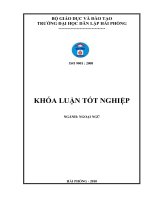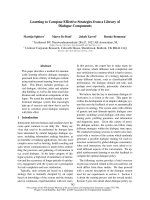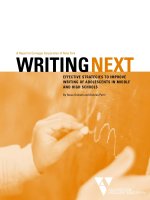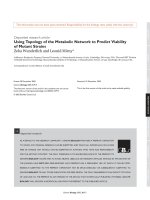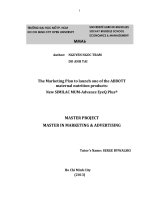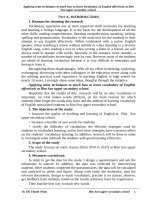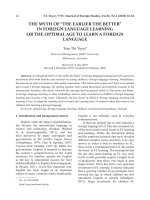The effective strategies to learn vocabulary of huflit foreign languages department seniors graduation paper
Bạn đang xem bản rút gọn của tài liệu. Xem và tải ngay bản đầy đủ của tài liệu tại đây (724.67 KB, 44 trang )
MINISTRY OF EDUCATION AND TRAINING
HO CHI MINH CITY UNIVERSITY OF FOREIGN LANGUAGES AND
INFORMATION TECHNOLOGY – (HUFLIT)
DEPARTMENT OF FOREIGN LANGUAGES
GRADUATION PAPER
THE EFFECTIVE STRATEGIES TO LEARN VOCABULARY OF
HUFLIT FOREIGN LANGUAGES DEPARTMENT SENIORS
Instructor: Vo Le Thuy Nga (M.A)
Student: Tran Ngoc Hong Phuc
Student’s number: 15DH710050
Class: TA1505
HO CHI MINH CITY, June, 2019
INSTRUCTOR’S COMMENT
..............................................................................................................
..............................................................................................................
..............................................................................................................
..............................................................................................................
..............................................................................................................
..............................................................................................................
..............................................................................................................
..............................................................................................................
..............................................................................................................
..............................................................................................................
..............................................................................................................
..............................................................................................................
..............................................................................................................
TRAN NGOC HONG PHUC
2
NAME: Tran Ngoc Hong Phuc
STUDENT ID: 15DH710050
UNIT NAME: Graduation Paper
EMAIL ADD:
DATE SUBMITTED: June 18th, 2019
WORD COUNT: 5325
Declaration
I certify that the attached material is my original work. No other person’s work or ideas have
been used without acknowledgment. Except where I have clearly stated that I have used some
of this material elsewhere, I have not presented this for assessment in another course or unit at
this or any other institution.
Name/signature
Date: June 18th,
2019
TRAN NGOC HONG PHUC
3
ACKNOWLEDGEMENT
This study would never have been completed if it had not received the
support and help of many people.
Firstly, I want to express my sincere thanks to Ms. Thuy Nga who willingly
accepted to instruct me during 5 months of this graduation thesis project. Her
warm encouragement, meticulous guidance and excellent assistance contributed a
lot to the completion of this thesis. Her willingness to give abundant ideas and
suggestions as well as correct my research has been very much appreciated.
Secondly, I greatly appreciate the support of Huflit English major students
who willingly took part in and gave their precious time and effort to complete the
survey. If they had not agreed to participate, the project would have never seen the
full fruition.
Lastly, I am very thankful to have my beloved family and friends who
always encouraged me and gave precious advices which helped me a lot to finish
my research. I am particularly grateful for the encouragement given by my mother
who gave me the moral support during this tough time. Special thanks should be
given to my friends who gave me consolation and positive encouragement when I
had difficulties in doing the research. They wholeheartedly assisted me to
complete the survey without any impediment.
TRAN NGOC HONG PHUC
4
ABSTRACT
Vocabulary learning strategies are ways that each student employs to help
himself remember words deeply and use them in necessary situations as well as
the useful tools which help people to achieve their goal effectively. The aim of
this research was to find out popular difficulties of Huflit English major students
in learning vocabulary and investigated effective strategies which help students
overcome their problems. The participants of this survey were 50 seniors who are
studying English as their major in Foreign Languages Department at Ho Chi Minh
City University of Foreign Languages and Information Technology (HUFLIT).
The data was collected through qualitative and quantitative analysis. The results
showed that almost students believe that the strategies can help them improve
vocabulary learning outcome. The most effective strategies are using support tools
such as dictionaries or applications on telephones or Website and listening to
English songs, watching English films or reading English books because of their
convenience as well as the low cost. Vocabulary learning strategies are really
important which help to improve student’s vocabulary size as well as language
learning process.
Keywords: Vocabulary learning strategies, language learning, effective
strategies, HUFLIT seniors
TRAN NGOC HONG PHUC
5
TABLE OF CONTENTS
ABSTRACT ...................................................................................................... 5
1. INTRODUCTION ................................................................................. 8-12
1.1 Background ........................................................................................... 8
1.2 Problem Identification.......................................................................... 9
1.3 Research Objectives ........................................................................... 11
1.4 Scope of the Study .............................................................................. 11
1.5 Research Organization ....................................................................... 12
2. LITERATURE REVIEW ................................................................... 13-20
2.1 What is vocabulary? ........................................................................... 13
2.2 What is vocabulary learning strategies? ........................................... 14
2.3 Subjective factors effecting on vocabulary learning process ............ 15
2.4 Objective factors effecting on vocabulary learning process ............. 16
2.5 Classification of vocabulary learning strategies ............................... 18
3. RESEARCH METHODOLOGY ....................................................... 21-22
3.1 Description of the Subjects................................................................. 21
3.2 Procedures of Data collection ............................................................ 21
3.3 Statistical Treatment .......................................................................... 22
4. RESULTS ............................................................................................ 23-29
4.1 Difficulties in learning vocabulary .................................................... 23
4.2 Exploring meaning of unfamiliar words ........................................... 25
4.3 Keeping words in long-term memory ................................................ 26
4.4 Positive changes when applying these methods ................................ 28
TRAN NGOC HONG PHUC
6
5. DISCUSSION AND RECOMMENDATIONS .................................. 30-33
5.1 Purpose of the Study .......................................................................... 30
5.2 Findings and Explanation .................................................................. 30
5.3 Limitations .......................................................................................... 32
5.4 Implication .......................................................................................... 32
5.5 Recommendations .............................................................................. 33
REFERENCES ............................................................................................... 34
APPENDIX A: RESEARCH PROPOSAL ................................................... 36
APPENDIX B: STUDENT’S QUESTIONNAIRE ....................................... 42
TRAN NGOC HONG PHUC
7
CHAPTER I
INTRODUCTION
1.1 Background:
Nowadays, no one can deny that English is a global language which appears
everywhere in this integration and immigration age. People can hear it on
television which spoken by politicians from all over the world. If people go
abroad, they can see the English signs and advertisements on streets. If people go
to a restaurant, they will see the English menu beside the native one (Crystal,
2003). It is not easy to calculate English proportional use towards the other
languages in daily life. It is estimated that more than 50% of academic papers
which were printed every year are written in English, and it was increasing yearly.
English is also an unquestioned language of science and technology, and many
countries was changing scientific journals from lingos to English. According to
Noack (2015), English is by far the most common studied foreign language in the
world with over 1.5 billion learners. Learning English is really important because
it takes a part in helping people to contact with the world’s development and
culture. Moreover, it is also beneficial in getting jobs and expands more
opportunities for leaners in a modern life which requires foreign languages in
many jobs (Chơn, 2018). English is not only a global language but also the
common language of business over the world. Because both communication and
business have been globalized, there is a need for a common spoken and written
language which can be understood and accepted across borders. All the borders of
ethnic, race and religion exist because human created them. Therefore, cross-
TRAN NGOC HONG PHUC
8
border learning means breaking all the borders to see the whole world; and English
is one of the weapons for us to break those limits. Understanding that situation,
Viet Nam has put English into official education program as a compulsory subject
in colleges since March, 2019 (An, 2018). However, Vietnamese students still
have many problems when learning and using English. In fact, Ánh (2018) said
that there were only 10 to 15 percent of students who can reach the English
outcome standard in universities in 2016. One of the essential elements which
helps English learners to gain the best result is vocabulary size. However, most of
English learners in Viet Nam have an inadequate size of vocabulary which is not
enough for even the basic daily conversations. To success, learners have to apply
not only one method but also the combination of strategies, methodologies and
different practical activities to learn new words effectively.
1.2 Problem identification
The main section of language is vocabulary which plays a very essential
role in language learning process. If people wish to use a language fluently, they
need to be excellent in all of four skills: listening, speaking, reading and writing.
A learner with an inadequate size of vocabulary will not effectuate language
excellently (Susanto, 2017). However, vocabulary has not been appreciated in
teaching foreign languages for many years. It becomes a serious problem,
especially in Asian countries. A big dictionary includes about 128.000 word
families in it, and it is estimated that average college students know about 58,000
normal basic words, 1,700 rare basic words and 96,000 derivatives and
compounds (Zhang, 2011). People tend to attach more special importance to
grammar than vocabulary, and it usually becomes a measurement to evaluate a
TRAN NGOC HONG PHUC
9
person’s English ability. However, this is the wrong way to approach English,
because vocabulary is a basis step; therefore, it need to be learned carefully before
starting learning other parts of English. How people understand a strange word
immediately when they see it, how they remember a number of vocabulary by
their effort or how they use them effectively when communicating in practice is a
hard problem for them to achieve (Susanto, 2017).
Similar to the above findings, many Vietnamese students in general as well
as HUFLIT students in particular have problems with vocabulary learning. Firstly,
students cannot recognize sounds when listening to English. This problem
proceeds from the lack of the adequate vocabulary and wrong pronunciation, and
when foreigners say with a correct pronunciation, they cannot recognize them.
English is different from Vietnamese; therefore, learners usually have some basic
mistakes when pronouncing a word such as sound swallowing, lack of stressed
sound and intonation, etc. Thus, when listening to a foreigner with their fast
pronounce, spirant and ligature, learners cannot recognize the words which leads
to the poor listening ability. Secondly, although they have had a long time of
studying this foreign language, they cannot speak English naturally. It takes them
a long time to response to the opposite person. For example, when somebody asks
them “How are you?”, they will translate the sentence to Vietnamese, and then
they translate again the answer from Vietnamese to English. This habit results in
the postponed and interrupted conversation because they cannot expose their
thoughts smoothly. Lastly, students are short of confidence because of the anxiety
of making mistakes and the poor response ability which leads to the unconfident
and hesitant state. Gradually, it makes learners become negative and think that
TRAN NGOC HONG PHUC
10
they cannot communicate in English. Most of above problems originate in the lack
of basic knowledge, correct pronunciation and especially vocabulary.
1.3 Research objectives
Although, there are a lot of ways to learn new words, but people still wonder
about their methods and desired effects. The purpose of this study is to find out
main difficulties in vocabulary learning of Vietnamese students in general and
Huflit English major students in particular. Thence, the study investigates useful
strategies which help students to overcome their problems and complete their
language skills as well as what these strategies have effected on learners.
1.4 Scope of the study
There are many researchers who wrote about vocabulary learning topic
before. In the research “Vocabulary teaching and learning principles in classroom
practice” by Ismail (2017), he pointed out ten principles which are essential in
ensuring the success of vocabulary acquisition and how the teachers implemented
these principles to teach vocabulary in classroom. The study “The teaching of
vocabulary: A perspective” (Susanto, 2017) mentioned the profound knowledge
of vocabulary learning and some issues which are related to the melioration of
learner’s vocabulary size, such as what to teach and how to teach. Although many
studies have been done, there is still some misapprehension about which strategy
is effective for learner self-studying.
This study will focus on efficient methods which learners apply to improve
their vocabulary size and how these manners have helped them in their learning
process. The English major seniors at Huflit who have learnt English for few years
TRAN NGOC HONG PHUC
11
or more and have the experience of studying vocabulary will be examined, and
they will also participate in this survey.
1.5 Research Organization
This study will be divided into five sections. The first part of this research
study is the introduction about vocabulary and vocabulary learning strategies.
Domestic and foreign studies will be reviewed in the second part. The third part is
the method which the researcher uses to carry out the research. In the part 4, the
research findings and discussion will be outlined. In the terminal part, the report
gives a conclusion with recommendations to improve and develop methods of
vocabulary learning result for Vietnamese students.
TRAN NGOC HONG PHUC
12
CHAPTER II
LITERATURE REVIEW
2.1 What is vocabulary?
Learning a new language cannot be separated from vocabulary. It means
that while learning a foreign language, people must know its vocabulary. Izzah
(2015) stated that “Vocabulary is a word or list with meaning and which is known
by speakers and which is used to communicate among those speakers and used by
the group or individual”. Vocabulary is a word or list and the central of language
which is the instrument to express feelings and ideas as well as declare thoughts
between people. Without a sufficient quantity of vocabulary, people may be in
trouble with daily activities which require English, such as listening, speaking,
reading and writing. We can say that vocabulary is: (1) every word which a person
knows and utilizes, (2) every word of a specific language, (3) every word that a
person utilizes when communicating, (4) a series of words and their meanings,
particularly the foreign language learning books.
Rohmatillah (2014) also devided words into two forms. Firstly, oral
vocabulary is the set of words; and people know the meaning when speaking or
reading orally. Secondly, print vocabulary includes words which the meaning is
known when people write or listen quitely. Furthermore, the writer defined that
the knowledge of words also appears in at least two forms. Firsly, productive
vocabulary is the set of words which people can use in speaking or writing. They
are familiar and well-known words. Secondly, receptive or recognitive vocabulary
is the form of words that people usually assign their meanings when they are
TRAN NGOC HONG PHUC
13
reading or listening. These words are often unfamiliar and less well-known to
students. They are words which people do not use naturally; though, when meeting
these words, individuals can recognize them, even if incompletely.
2.2 What is vocabulary learning strategy?
Vocabulary learning is a sub-category of a language learning process. In the
learning process, people try to apply as many methods as possible in order to be
expert in the target language in an efficient time (Ismail, 2017). Asgari (2011) said
that vocabulary learning strategies are ways used by the language learners which
help them to acquire new English words. In other word, they are methods that
learners exert to use in order to improve their language ability. They are essential
because they help a learner to be active and take responsibility for their learning
process (Goundar, 2015). Asgari (2011) believed that there are two main groups
of vocabulary learning strategies. They are discovery strategies which are used to
discover meaning of words, and consolidation strategies which are used to
consolidate the words when they have been encountered. Saengpakdeejit (2014)
stated that vocabulary learning strategies are known as the knowledge about
mechanisms which are used in order to learn new words as well as actions and
steps performed by students. The purpose of vocabulary learning strategies is to
(1) discover meaning of new words, (2) keep them in long-term memory, (3) recall
them whenever and (4) apply them in oral and writing mode.
TRAN NGOC HONG PHUC
14
2.3 Subjective factors effecting on vocabulary learning process
The factors that effect on vocabulary learning process are reasons which
result in the final outcome and appear during the student’s learning progress.
When a person is aware of what can effect on his studying, he can think about how
to adjust them to make them become suitable for his situation. Most of the previous
researchers pointed out two main kinds of factors that affect the learners. Those
are subjective factors or we can call them as learner individual difference factors
and objective factors or we can call them as social and situational factors.
Subjective factors or learner individual difference factors are things which
based on human beings, personal characters, thoughts and feelings. When
mentioning about the subjective factors, Linh (2017) stated that they consist of
learner’s awareness and their interest of learning vocabulary. With an adequate
vocabulary size, it will be not difficult for students to be fluent in other skills.
Therefore, she believed that the awareness of vocabulary learning importance has
a particular role in student learning process. Interest is the special attitude of a
person towards something which can be meaningful in life and brings the pleasant
feeling during his (her) activity. When a student is interested in English, he will
know and understand how important it is in his life. Subsequently, it creates the
mentality of attracting a person towards that subject and he really want to discover
and find out about it without unwillingness, and he will feel comfortable when
acquiring knowledge. Meanwhile, Boonkongsaen (2012) believed that there are
four things of a person which help him achieve good results in vocabulary
learning. They are the belief of vocabulary importance and usefulness, positive
TRAN NGOC HONG PHUC
15
attitude towards what we are doing, high motivation (student’s inherent interest in
vocabulary learning) and previous language learning experience.
2.4 Objective factors effecting on vocabulary learning process
The last main factors affecting the learner’s use of vocabulary learning
strategy are objective factors or we can call them as social and situational factors.
Objective factors are affecting elements which based on learner’s situation,
surrounding background and environment. Examining on sixth graders in two
middle schools in Hanoi, Linh (2017) found that there are two elements which
influence on student’s vocabulary learning. They are known as teacher’s teaching
methods and studying equipment and materials. There are many English teaching
methods which have been applied at Vietnamese schools, such as presentation,
oral, case study, etc. Each of methods has its own strengths as well as weaknesses
which effect a lot on student’s learning result generally and vocabulary
memorization ability particularly. After her survey, she stated that, most of the
students are interested in group work activity. The second method that students
want to be used in English lessons is visual method by showing pictures, video
clips, etc. Besides, teaching and studying means have a big role in foreign
language acquirement. They are divided into two different means that are outside
and inside means. Outside means are machines supporting learner’s language
ability improvement, especially listening and speaking improvement, such as
projector, television, cassette, etc. Inside mean is using studied language in other
learning activities. According to the modern language teaching perspective,
reduction of using native language in foreign language teaching is really
necessary. Therefore, leaners should apply studied vocabulary in the next learning
TRAN NGOC HONG PHUC
16
activities. It helps the learner remember new word effectively and become
confident when communicating in English. Beside recommended factors above,
Boonkongsaen (2012) suggested five more social and situational factors which
comprehend the field of study, course type, class level, gender and language
learning environment. Students from different majors will have different learning
strategies which are suitable for them. It is found that students studying English
and non-English major employ vocabulary learning strategies severally. Course
type is a key element influencing on the vocabulary learning strategy use which
relates to “regular” or “part-time” programs. It is found that the use of vocabulary
learning strategies of students from regular program and morning course is greater
than part-time and evening-course students. Class level is a clear reason effecting
on the way that vocabulary learning strategies are used. It is found that the more
advanced students are, the more used strategies like skipping a new word are.
Among these factors, gender receives a great notice from researchers. Some
researchers believed that female and male students have differences significantly
in employing strategies; meanwhile, other ones stated that there is no difference
in the use of vocabulary learning strategies between male and female students. The
language learning environment is divided into formal and informal learning
environment. Formal environment is the teacher’s encouragement to learn a new
word; while the informal environment is related to the role of supportive and
unsupportive parents. Students who live with supportive parents will have great
use of vocabulary learning strategies than the ones living with their unsupportive
parents.
TRAN NGOC HONG PHUC
17
2.5 Classification of vocabulary learning strategies
During the language acquiring process, learners who wish to master
vocabulary have to face many challenges. Therefore, they need to know the
strategies which help them to acquire the meaning of words. Vocabulary strategies
were divided into 2 basic types relied on their purposes (Saengpakdeejit, 2014).
This more specific division helps us to see the whole of vocabulary learning
strategy kinds based on their purposes and choose suitable strategy for each person
need and aim. They are strategies for exploring meaning of unfamiliar words and
strategies for keeping lately studied vocabulary in the long-term memory and
using them whenever or we can call these strategies as consolidation strategies
(Easterbrook, 2013).
Strategies for exploring the meaning of unfamiliar words are ways that
students employ to know the meaning of a new word with or without any help.
This kind of strategies consists of three sub-categories: discovery strategies, social
strategies and support strategies. Discovery strategies are carried out to help the
learners to get the meaning of words without any support from any one. There are
eight strategies in this category: (1) Conjecturing the meaning by its context, (2)
Conjecturing the word by dissecting its part of speech, (3) Conjecturing the
meaning through the sentence’s grammatical structure, (4) Conjecturing the
meaning by dissecting the word’s affixes and roots, (5) Conjecturing the meaning
through aural characteristics such as pronunciation, stress, etc., (6) Conjecturing
the meaning through real conjuncture, (7) Conjecturing the meaning through
gestures and attitudes, (8) Conjecturing the meaning through pictures, graphs or
figures, etc. Social strategies help learners to understand the meaning of word by
TRAN NGOC HONG PHUC
18
interacting with surrounding people such as teachers, friends, classmates, etc. The
strategies in this category consist of: (1) inquiring friends or classmates about
meaning of word, (2) inquiring teachers about the meaning, (3) inquiring family
members or English native speaker about the meaning. Support strategies are ways
which help learners discover the word’s meaning through assistant devices such
as dictionary. The strategies in this category contain: (1) Using the EnglishEnglish dictionary, (2) Using the English-Vietnamese dictionary, (3) Using
electronic dictionary such as dictionary programs and applications on telephone
and Internet, (4) Using website on the Internet.
Strategies which students employ to remember learned vocabulary and use
them whenever include memory strategies, cognitive strategies and metacognitive
strategies. Memory strategies help learners to keep learned words in their longterm memory through mental process by connecting the word with their
knowledge. This category includes nine strategies, they are: (1) Connecting the
word with a Vietnamese word which has the same sound, (2) Applying learned
words into daily dialogue, (3) Thinking about using learned word in fictitious
situation, (4) Using the combination of word and concept, (5) Connecting the word
with a specific image in mind, (6) Constructing sentences with lately learned
words, (7) Connecting the word with another English same-sound word, (8)
Connecting the word with another English word which has the same spelling, (9)
Connecting the word with a person’s experience. The second category known as
cognitive strategies which are routines helping the learners to keep the meaning of
word in their long-term memory. The strategies in this category consist of: (1)
Saying the word and its meaning recurrently, (2) Writing down the new words
with their meanings on notes and sticking them on wherever easily seen and
TRAN NGOC HONG PHUC
19
repeating them, (3) Writing down new word list with their meanings and examples
on notebook and reviewing them whenever you can, (4) Using word card. The last
category is metacognitive strategies which are carefully planned methods helping
the learners to remember vocabulary. It consists of eight strategies in total: (1)
Doing English exercise after class, (2) Classifying learned words into groups
based on their resemblance of spelling and pronunciation, (3) Classifying learned
words into groups based on their resemblance of synonyms and antonyms, (4)
Doing dictations, (5) Playing crossword puzzles and scrabble, (6) Watching
English films with subtitles, (7) Reading English books, magazines, newspaper,
etc., (8) Listening to English songs.
All the detailed strategies above are solutions for learners to deal with their
problems during the language learning process generally as well as vocabulary
learning process particularly.
TRAN NGOC HONG PHUC
20
CHAPTER III
RESEARCH METHODOLOGY
3.1 Description of the Subjects
The participants for this survey were 50 senior students who are studying in
Foreign Language Department at Ho Chi Minh City University of Foreign
Languages and Information Technology. All of these students have experienced
learning foreign languages as well as vocabulary for at least four years and take
interest in information and news about vocabulary and its learning strategies.
Choosing experienced students was really necessary because those students would
give precise, straightforward and valuable answers.
3.2 Procedures of Data collection
The aim of the questionnaire survey was to find out which effective
strategies that students have applied during their vocabulary learning process and
how they have effected on their learning outcome. The questionnaires were
delivered to 50 students with 9 questions. In there, the first 5 questions were
created to gather student’s opinions and habits about their own vocabulary
learning process and the last 4 questions were disposed for the purpose to define
student’s main difficulties when learning vocabulary, strategies which students
think they can be effective to acquire and their positive influence on vocabulary
leaning outcome. The investigation was carried out during break time when
students gathered at Huflit lobby. The researcher gave the questionnaires to
students; then, the researcher gave particular direction to participants to do the
survey. The topic is not unfamiliar to English major students; therefore, it was not
TRAN NGOC HONG PHUC
21
complex for them to accomplish it. However, they had to do the survey honestly,
completely and carefully. Students had 5 to 10 minutes to complete the
questionnaires and returned them to researcher. After that, the researcher
summarized the results from them.
3.3 Statistical Treatment
In this paper, after the general survey, the data will be performed within
Excel because this tool is widely used for the entry and management of data. The
processed data are showed in Results.
TRAN NGOC HONG PHUC
22
CHAPTER IV
RESULTS
4.1 Difficulties in learning vocabulary
8%
4%
36%
52%
Pronunciation
Dictation
Meaning
Usage
Figure 1: Difficulties in learning vocabulary
The Figure 1 shows the main problems that learners usually have during
their vocabulary learning process. In general, the majority (52%) of Huflit students
in Foreign Languages Department had to face the problem of remembering the
meaning of new words. To keep the words in the long-term memory after learning
them, the students should usually look at them again. The more times learners see
a word, the more easily they can remember it. Over a third of 50 students found
that it was difficult to use words correctly and suitably for different contexts and
situations. To improve this issue, learners should learn the words in phrase and
use them in fictitious situation and watch English movies to remember the ways
that foreigners use. Furthermore, the result shows that almost a sixth of students
TRAN NGOC HONG PHUC
23
believed that their biggest difficulty in learning vocabulary was correct
pronunciation. Some methods for this problem are using dictionary applications,
listening to English songs and communicating with foreigners usually. 4% of
students got the issue with doing dictation. Writing down words into notebook or
writing diary with learned words will help learners a lot in remembering spelling.
TRAN NGOC HONG PHUC
24
4.2 Exploring the meaning of unfamiliar words
35
30
30
25
25
20
19
16
18
15
16
15
10
7
4
5
0
Using tools
Asking
Agree
Total agree
Guessing
No idea
Figure 2: The strategies of exploring meaning of unfamiliar words
The figure 2 shows strategies which are used to discover the meaning of
unfamiliar words. Among of these three selected methods, using tools was the
highest used method. There were 30 students doing the survey agree to use. Using
support tools consists of English – English dictionaries, applications on telephone
or Internet and Websites which are convenient as well as entertaining because
learners could learn them anywhere and anytime. Guessing meaning by its context
and situation was the second highest agreement with 25 students. There are some
types of guessing a word such as guessing by its sentence’s grammatical structure,
part of speech or affixes and roots. Furthermore, there were 19 people who agreed
to ask their teachers or their classmates about the unknown words. Although
teachers are experienced people, it is quite inconvenient to ask them frequently
because of the lack of time in class.
TRAN NGOC HONG PHUC
25
